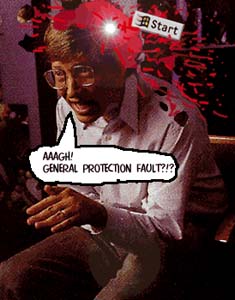
Brain Explosion
By Stephen Hait
Domain Name Game
Have you noticed how Internet website addresses are creeping more and more into the media these days? These are the cryptic bit stuck at the end of more and more commercial messages in the form of "http://www.somename.com" and is also referred to as a domain name.
For any company with a website there is an obvious benefit to having a domain name that's easy to remember. They hope that if you're interested in visiting their website you only have to remember their trademark name and type www.sony.com, for instance, into your browser to pay them a visit (some browsers, such as Netscape's, even let you just type "sony" and allow you to skip all the other "http://.." mumbo jumbo.) The advantage of a catchy domain name over a less obvious one is that it's much more likely someone would stop by for a visit on a whim if she only had to type in the name of the company than if she had to search for the address some other way. It's similar to the rash of vanity names used with toll-free telephone numbers that attempt to lodge themselves in your memory like 1-800-COLLECT. The companies behind these sites want them to be easily found.
Theoretically, anyone can register as many domain names as they wish as long as the names aren't already taken. The registration is easy and currently only costs $50 per year. Some enterprising folks registered lots of potentially attractive names in the last two years before a lot of companies realized that if they weren't on the web they were dead. These crafty speculators hoped that they could turn right around and sell their right to the domain name for big bucks to the rightful trademark holder. A writer for Wired magazine registered mcdonalds.com in 1994 and was subsequently threatened with a lawsuit by the burger giant. The matter was settled out of court with McDonalds making a charitable donation in exchange for the use of the name. Other companies coming late to the web have decided to fight back against this perceived blackmail. So far the courts have tended to uphold the rights of the legitimate trademark owner.
Most vanity domain names are the same as a company's trademark name. Unlike trademark names, however, there can be one and only one domain name that refers to one and only one company. This is where the issue of trademarks gets stickier. For example, both Apple Computer and Apple Records (remember the Beatles?) can each claim "Apple" as a trademarked logo in their different realms. On the Internet, however, only one entity in the world can be www.apple.com. Even though the apple.com domain name belongs to Apple Computer any other company could have claimed it had they registered it first. In fact, anyone at all could have registered apple.com. So Apple Records isn't also able to use apple.com.
Some large companies have taken the offensive by quietly registering Internet domain names which give them worldwide rights to those names. Proctor & Gamble has registered names such as "badbreath.com," as well as 35 other maladies including "dandruff.com," "headache.com," "underarms.com," "pimples.com" and even "diarrhea.com", perhaps in preparation for the nationwide Olestra roll-out. P&G has also registered 52 of its products from Luvs to Metamucil. Kraft Foods has locked up 133 important product names, from "velveeta.com," to "sanka.com" and 21 generic foods groups including "saladdressing.com," "weiners.com," bologna.com," and even "frozendinners.com."
Another wrinkle in all of this is people who set up websites using bogus domain names designed to appear legitimate. Take "dole96.org". If you punch this one into your browser you'll arrive at an official looking website that appears on the surface to be the online headquarters for the Dole/Kemp presidential campaign. That the site is a parody quickly becomes obvious after reading the slogan, "BOB DOLE FOR PRESIDENT, THE RIPE MAN FOR THE JOB". Needless to say, the joke hasn't gone over particularly well in the Dole camp whose actual website domain is the similar "dole96.com" (not ".org".) Not much they seem to be able to do about it, though, since the satirical site is still online.
As the rush to register domain names and establish websites continues to escalate, many new legal and ethical issues are emerging. Many long accepted standards are beginning to break down in light of the new technology issuing from the Internet. At this point many traditional solutions seem to need an overhaul and assumptions involving ownership and free speech appear headed for a showdown in the context of the goldrush mentality accompanying this rapidly evolving technology.